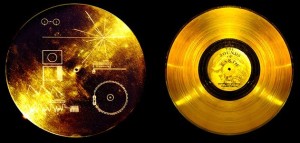Voyager 1 and 2 were two robotic probes launched into the outer solar system in 1977. Their timing was impeccable, launched in a rare window where a single vehicle could encounter all four gas giants without requiring any course corrections aside from gravity assists. To this day, Voyager 2’s pictures of Uranus and Neptune are the highest resolution available.
Attached to each probe was a gold record. They contain a variety of images and sounds of Earth, from music to rain, to “hello” in a number of languages. As a kid, when I first heard about this, I took the idea of the messages for granted; aliens could pick it up and know who we are and stuff, maybe drop in and say hello.
The deeper meaning of the records wasn’t abundantly clear until I remembered the context of the 1970’s; it’s striking how different things are now than they were then.
These days, I can pull up any song I want, any time I want. I can rip it, copy it, and aside from the opinions of a few douche-canoes at the RIAA, distribute it to whomever I want at no apparent cost except that of the electricity to run my computer.
At the time, though, music was etched into plastic–not with lasers but with needles–worn down with each precious play. Data was transmitted on physical media. The existence of that physical world was punctuated each waking moment with the impending doom of nuclear war. Carl Sagan–in large part responsible for arranging the record–comes back to the theme of nuclear war throughout his multi-part television series Cosmos, often noting the precarious position of humanity in the 20th century. Impending nuclear war comes across as quaint–at least it did when I first was dwelling on this–but it was a possible ending to his–and our–world.
Sagan and others suggested future humans may be able to pick up the gold record. Aside from being a novel object–a one of a kind artifact–it was unclear why this was meaningful. However, in the context of atomic bombs blowing the living hell out of every city on earth, it was far more obvious. The plastic records of human civilization would have melted away, perhaps further lost through strife of war, revolution, or change.
The gold record carried the idea that some how, by some means, our culture had endured. Something else–distant ancestors or life alien–could pick the sounds of us up, decipher our message, and know us–know what we heard and what we felt, to know Johnny B Goode and “Der Hölle Rache kocht in meinem Herzen.” It wasn’t just a message to aliens, but to the post-apocalyptic humans who would have had no way to know us, with our cities and records reduced to glass and ash. Through the gold records, in some way, even if we failed to create peace on earth and lost ourselves, we had endured in eternal memory of anyone, human or otherwise, that could have come after us.

